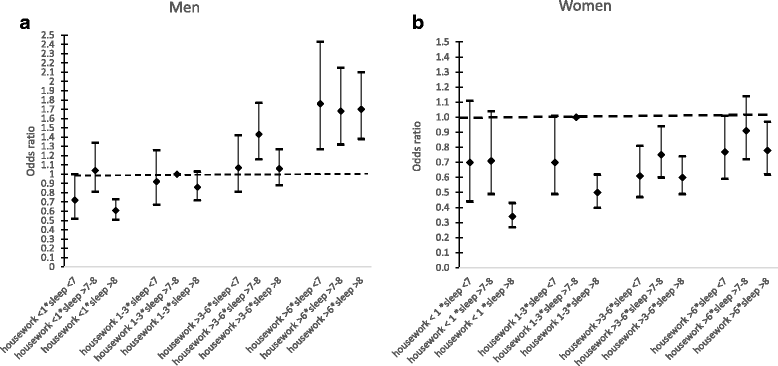Investigating the associations between productive housework activities, sleep hours and self-reported health among elderly men and women in western industrialised countries
- PMID: 29320997
- PMCID: PMC5763579
- DOI: 10.1186/s12889-017-4979-z
Investigating the associations between productive housework activities, sleep hours and self-reported health among elderly men and women in western industrialised countries
Abstract
Background: After retirement, elderly men and women allocate more time to housework activities, compared to working-age adults. Nonetheless, sleep constitutes the lengthiest time use activity among the elderly, but there has not been any study on the associations between time spent on housework activities, sleep duration and self-reported health among the older population. This study not only examined individual associations between self-reported health and both housework activities and sleep duration, but it also explored self-reported health by the interaction effect between housework activities and sleep duration separately for men and women.
Methods: Pooled data from the Multinational Time Use Study (MTUS) on 15,333 men and 20,907 women from Germany, Italy, Spain, UK, France, the Netherlands and the US were analysed. Multiple binary logistic regression models were used to examine the associations between three broad categories of housework activities ((1) cooking, cleaning and shopping, (2) gardening and maintenance; (3) childcare) and health. We further investigated the extent to which total housework hours and sleep duration were associated with self-reported health for men and women separately.
Results: We found a positive association between time devoted to housework activities, total housework and health status among elderly men and women. Compared to those who spent 1 to 3 h on total productive housework, elderly people who spent >3 to 6 h/day had higher odds of reporting good health (OR = 1.25; 95% CI = 1.14-1.37 among men and OR = 1.10; 95% CI = 1.01-1.20 among women). Both short (<7 h) and long (>8 h) sleep duration were negatively associated with health for both genders. However, the interactive associations between total productive housework, sleep duration, and self-reported health varied among men and women. Among women, long hours of housework combined with either short or long sleep was negatively associated with health.
Conclusions: Although time allocation to housework activities may be beneficial to the health among both genders, elderly women have higher odds of reporting poor health when more time is devoted total housework combined with either short or long sleep duration.
Keywords: Elderly; Gender; Housework activities; Self-reported health; Sleep duration.
Conflict of interest statement
Ethics approval and consent to participate
The authors were granted approval from the Multinational Time Use Study Review Board to obtain and use the collected data for analysis. All data were anonymized prior to the authors receiving the data.
Consent for publication
Not applicable
Competing interests
The authors declare that they have no competing interests.
Publisher’s Note
Springer Nature remains neutral with regard to jurisdictional claims in published maps and institutional affiliations.
Figures

References
-
- Grapsa E, Posel D. Sequencing the real time of the elderly: evidence from South Africa. Demogr Res. 2016;35:711–744. doi: 10.4054/DemRes.2016.35.25. - DOI
-
- Einolf CJ. Will the boomers volunteer during retirement? Comparing the baby boom, silent, and long civic cohorts. Nonprofit Volunt Sect Q. 2009;38:181–199. doi: 10.1177/0899764008315182. - DOI
MeSH terms
LinkOut - more resources
Full Text Sources
Other Literature Sources

